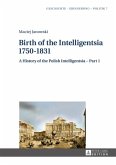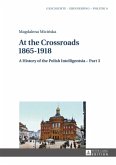The three-part work provides a first synthetic account of the history of the Polish intelligentsia from the days of its formation to World War I. Part two (1832-1864) analyses the growing importance of the intelligentsia in the epoch marked by the triumph of the Polish romanticism. The stress is put on the debates of the position of intelligentsia in the society, as well as on tensions between great romantic ideas and realities of everyday life. A substantial part deals with the genesis, outbreak and defeat as well as the consequences of the national uprising in 1863, whose preparation was to a high degree the work of the intelligentsia. The work combines social and intellectual history, tracing both the formation of the intelligentsia as a social stratum and the forms of engagement of the intelligentsia in the public discourse. Thus, it offers a broad view of the group's transformations which immensely influenced the course of the Polish history.
«Die insgesamt sehr flüssig geschriebenen Bände stellen auch für einen nicht auf die Ideengeschichte des 19. Jahrhunderts spezialisierten Leser eine sehr gut nachvollziehbare Darstellung der Gruppe dar, die für die gesamtgesellschaftlich-kulturelle, aber auch politisch-nationale Entwicklung zentrale Weichenstellungen vorgenommen hat. [...] Insgesamt handelt es sich um eine Synthese zur polnischen Gesellschafts- und Geistesgeschichte, die bereits jetzt zu einem Standardwerk geworden ist.»
(Heidi Hein-Kircher, Jahrbücher für Geschichte Osteuropas 6/2016)
(Heidi Hein-Kircher, Jahrbücher für Geschichte Osteuropas 6/2016)








